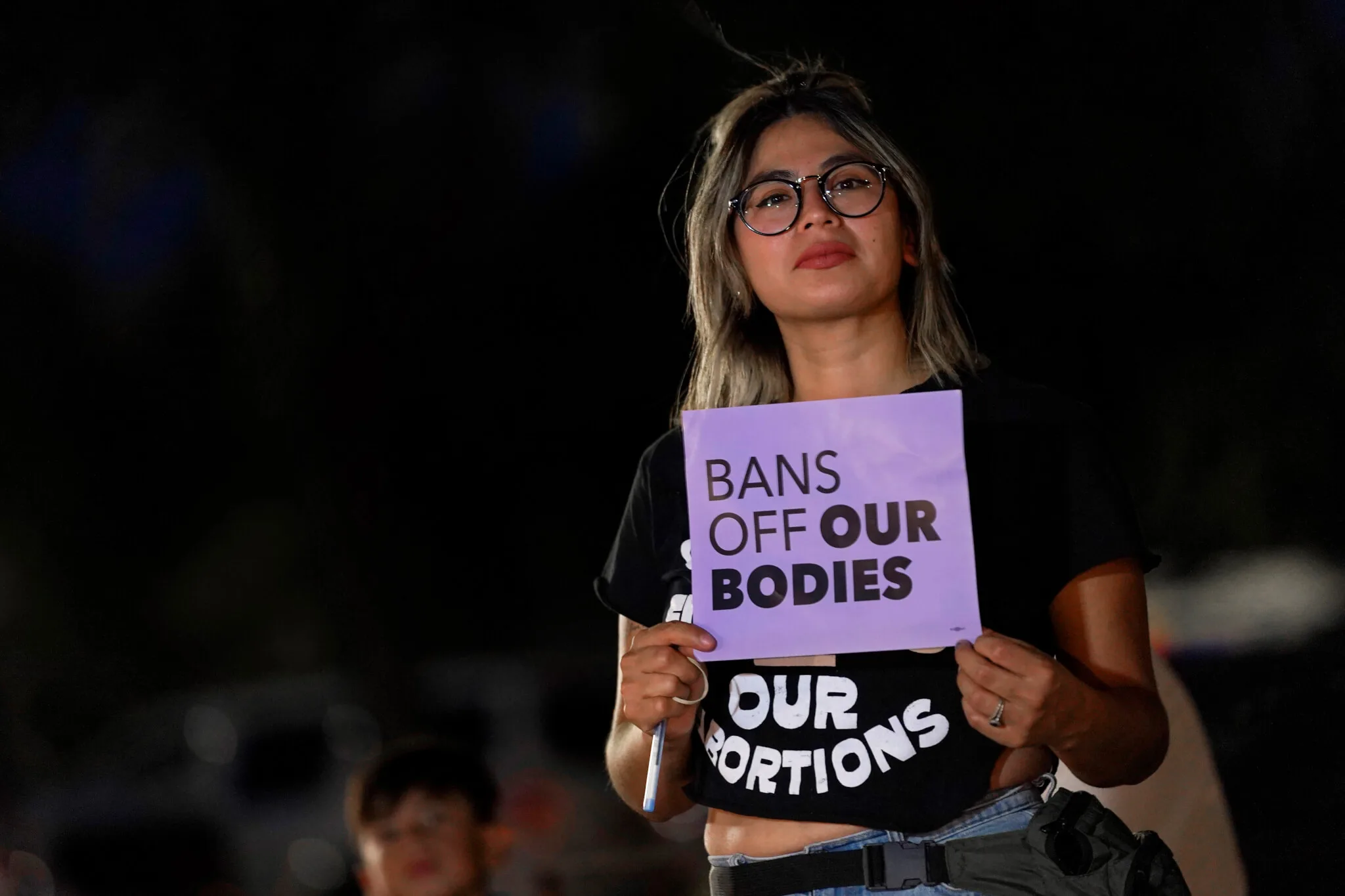
(AP Photo/Matt York, File)
Arizona’s Republican lawmakers have a long history of enforcing appalling laws that deny women of comprehensive reproductive rights.
On Sept. 23, a judge ruled that Arizona could enforce a near-total ban on abortions, which had been blocked for nearly 50 years by the Supreme Court ruling in Roe v. Wade that gave the constitutional right to an abortion.
RELATED: Almost All Abortion Now Illegal in Arizona
The statewide ruling meant clinics would have to stop providing the procedures to avoid criminal charges against doctors and other medical workers.
The judge lifted a decades-old injunction that blocked enforcement of the law, which has been on the books since before Arizona became a state. The only exemption to the ban is if the woman’s life is in jeopardy.
However, as The Arizona Republic reported, performing abortions to save a woman’s life will be close to impossible.
“Abortion providers have shared with us that this is a total ban because most OB-GYNs do not perform abortions,” Elsa Landeros, an organizer with Arizonans for Reproductive Freedom, told the Arizona Republic. “Even in a situation where the patient’s life is at risk, they won’t be able to be transported to an abortion provider in time to save their life.”
RELATED: Democrats Condemn Arizona Abortion Ruling
Last week’s ruling was received with dread by many—an estimated 76% of Arizona voters believe that abortion should be legal, and 91% are opposed to the state’s current abortion ban. So how did we get here?
Arizona’s horrendous abortion laws span almost 160 years. Here’s a timeline of Arizona’s laws against reproductive rights:
1864
Arizona, as a territory (not yet a state), passes ARS 13-3603, banning all abortions with a minimum sentence of two years imprisonment for a physician performing an abortion.
1971
The US Supreme Court ruled on its first case involving abortion in United States v. Vuitch, upholding a District of Columbia law permitting abortion only to preserve a woman’s life or “health.” However, the Court makes it clear that “health” means “psychological and physical well-being,” effectively allowing abortion in most circumstances.
1973
Following the landmark Roe v. Wade decision, laws banning abortion in the first trimester are declared unconstitutional in the US.
In particular, the Supreme Court recognized for the first time that the constitutional right to privacy “is broad enough to encompass a woman’s decision whether or not to terminate her pregnancy.”
Roe v. Wade protected the right to abortion in all 50 states, making abortion services safer and more accessible throughout the country.
An Arizona court injunction stopped the enforcement of the 1864 law, ARS 13-3603, following the rulings in Nelson v. Planned Parenthood and Roe v. Wade. This effectively legalized abortion up to viability (23-24 weeks) in Arizona.
2002
President George W. Bush signed the Born-Alive Infants Protection Act, affirming legal protection to an infant born alive after a failed attempt at induced abortion.
The following year, the Republican-led US Congress approved the Partial-Birth Abortion Ban Act, signed into law by President George W. Bush on November 5, 2003.
This law prohibits doctors from knowingly performing a “partial-birth abortion” (which is not a medical term but a political one).
RELATED: ‘Not Now, Not Ever’: Maricopa County Attorney Candidate Julie Gunnigle Says She Won’t Prosecute Abortions
The law states a “partial-birth abortion” is an abortion in which the person performing the abortion: “(1) deliberately and intentionally vaginally delivers a living fetus until, in the case of a head-first presentation, the entire fetal head is outside the mother’s body, or, in the case of a breech presentation, any part of the fetal trunk past the navel is outside the mother’s body; and (2) performs the overt act, other than completion of delivery, that kills the partially delivered living fetus”.
2012
The Republican-controlled Arizona legislature passes HB 2036, making abortion illegal in most cases after 20 weeks.
2018
The US Supreme Court became more conservative after Justice Anthony Kennedy’s retirement. Since then—and thanks in part to the three Justices appointed under the Trump administration—most justices in the US Supreme Court have leaned toward conservatism. According to NPR, the Supreme Court produced more conservative decisions this term than ever since 1931.
February 2022
The Arizona legislature passes SB 1164, making abortion illegal in most cases after 15 weeks. This would become law 90 days after the end of the legislative session. When passed, the law was at odds with Roe v. Wade and was expected to be challenged as being unconstitutional.
May 2022
A leaked draft opinion by Supreme Court Justice Samuel Alito indicated that the Court would strike down the landmark Roe v. Wade decision, which guaranteed federal constitutional protections of abortion rights.
June 24, 2022
The US Supreme Court overturns Roe v. Wade. As a result, all abortion providers in Arizona immediately “pause” abortion services to investigate the legality of continuing abortion services.
There is no immediate change in the status of the injunction against ARS 13-3603, and SB1164 does not go into effect until September 24, 2022.
July 13, 2022
Arizona Attorney General Mark Brnovich files a motion to lift the 1973 injunction against ARS 13-3603 following the Supreme Court’s decision to overturn Roe v. Wade.
July 19, 2022
While Planned Parenthood stated that their abortion services were on pause in Arizona, another provider, Family Planning Associates, resumed abortions in Arizona. However, their services were still extremely limited and only provided “Medication Abortion up to 11 weeks of pregnancy.”
September 1, 2022
Planned Parenthood resumes abortion services in Arizona at its Southern Arizona Regional Health Center in Tucson.
September 23, 2022
Pima County Superior Court Judge Kellie Johnson lifts the 1973 injunction against ARS 13-3603.
The ruling means medical clinics can no longer offer abortion services, and anyone seeking an abortion will have to go out of state. The ruling takes effect immediately, although an appeal is possible.
RELATED: The Majority of Arizonans Oppose 158-Year-Old Abortion Ban
Shortly after the ruling, Planned Parenthood and two other large providers said they were halting abortions.
In a statement by the last clinic to provide abortions in Arizona, Family Planning Associates said: “We are devastated by the Pima County Superior Court ruling and have suspended abortion services until we determine the legal status of abortion in Arizona. If you have an appointment scheduled with us in the coming days, we will call you to discuss your options.
“Abortion bans harm everyone, most especially Black, Indigenous women and pregnant people of color, and people experiencing poverty and homelessness. We are not done fighting. Please vote.”
For more information on your nearest abortion clinic, click here.
The Associated Press contributed to this report.
Looking for the latest Arizona news? Sign up for our FREE daily newsletter.
Politics

State Official: 1864 abortion ban gives Arizona ‘black eye’
Arizona’s role at the forefront of the climate crisis, defending democratic elections, and protecting reproductive rights has caught the attention...

Biden makes 4 million more workers eligible for overtime pay
The Biden administration announced a new rule Tuesday to expand overtime pay for around 4 million lower-paid salaried employees nationwide. The...
Local News

Arizona’s reality TV stars: Where are they now?
From A-list actresses to a controversial bachelor, here's a roundup of reality TV stars from Arizona. Whether you love it or hate it, reality TV is...

New funding keeps the homeownership dream alive for Avondale families
In a unanimous decision, the Maricopa County Board of Supervisors approved an additional $796,326 on March 27 to boost homeownership opportunities...





